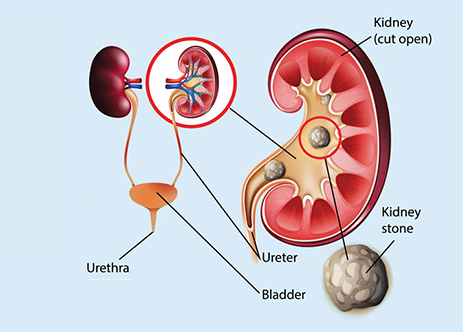Dr. Snehal Shankar Gaikwad is the director, consultant, and Best Nephrologist in Moshi Pune at Swanand Kidney Clinic, Bhosari, and Imperial Multispeciality Hospital, Chikali.
Causes of Kidney stones:
The main cause is less urine production. At least 1 litre of urine has to be generated daily. Other risk factors include too much or too little exercise, prolonged dehydration, weight loss surgery, high protein levels, salt, or glucose levels, obesity, and gastric bypass surgery. Medical conditions like renal tubular acidosis, cystinuria, and hyperparathyroidism also cause kidney stones.
Treatment of Kidney stones:
Kidney Stones are excruciating. Also, there is no medication cure in conventional methods. Doctors give only painkillers and diuretics. But when pain is increased, only surgery becomes the option.
Also, drink at least 1.8 to 3.6 litres of water per day. It will help you to remove small-sized stones naturally. Citric acid contained in fruit juices is very beneficial. But avoid too much consumption. These juices are lemon juice, apple cider vinegar, celery juice, basil juice, Pomegranate juice, kidney bean broth, Dandelion root juice, and wheatgrass juice.
Surgery
It depends on the size of the stone. Before going to surgery, the doctor also considers the symptoms. In Shock wave lithotripsy, shock waves are passed to the kidney. It breaks kidney stones into small pieces. The procedure takes 45 minutes to 1 hour using general anaesthesia. All pieces will pass out through urination. In Ureteroscopy, a long tool shaped like a tube is used to remove small-sized stones. If stones are larger then, these will be broken into small pieces. In Percutaneous nephrolithotomy, a tube is directly put into the kidney. The patient can be hospitalized for 2 to 3 days.
How can we prevent stones?
- Drink a lot of water and other fluids to keep urine output at least more than 2 litres per day. For this amount of urine excretion, you need to drink at least 3-4 litres of fluid. A simple and practical guide is to keep the urine colour very light yellow. The darker the urine colour, the higher the salt concentration.
- Reduce bad salts like calcium, oxalate, sodium, phosphorus and uric acid. Calcium is rich in dairy products and oxalate is rich in a lot of vegetables like spinach, beetroot, okra, leeks, rhubarb, cabbage etc, tea/coffee, chocolate and nuts. When we combine food containing calcium and oxalate, the excess salts get precipitated as calcium oxalate and get excreted in faeces, and not through kidneys.
- That's why the traditional teaching of calcium restriction failed to reduce stones. When calcium is restricted it increases oxalate excretion in the kidneys, thus increasing stone formation. Moderation (not restriction) in calcium intake is required. Milk products should always be combined with other food intake and not taken on an empty stomach.
- Reduce salt intake to less than 4 g per day. Yes, it should be less than a teaspoon for the whole day!
- Eat a lot of fruits. These are rich in stone inhibitors like potassium, citrate, magnesium, etc and also rich in antioxidants which protect against oxidative kidney damage.
Reduce animal protein intake. Animal proteins have a lot of stone-promoting contents. They also increase uric acid excretion.
- Do aerobic exercises daily. A sedentary lifestyle damages not only the kidneys but also all vital organs.
Prevent and treat any urinary infection.
Prevent and treat lifestyle diseases like diabetes, hypercholesterolemia and hypertension.
All of these practices can reduce the formation of a kidney stone. Despite all these efforts, you can still form a stone. Many of the factors causing stones cannot be still found using currently available technology. However, a complete evaluation including stone analysis, serum calcium, serum uric acid, serum parathyroid hormone, serum bicarbonate, and 24-hour urinary sodium, calcium, phosphorus, uric acid, magnesium, citrate, creatinine and urine pH can rule out common causes of stones. These tests will find out at least one abnormality in 97% of stone-formers. At Swanand Kidney Clinic, we offer advanced kidney stone treatment in Bhosari.









